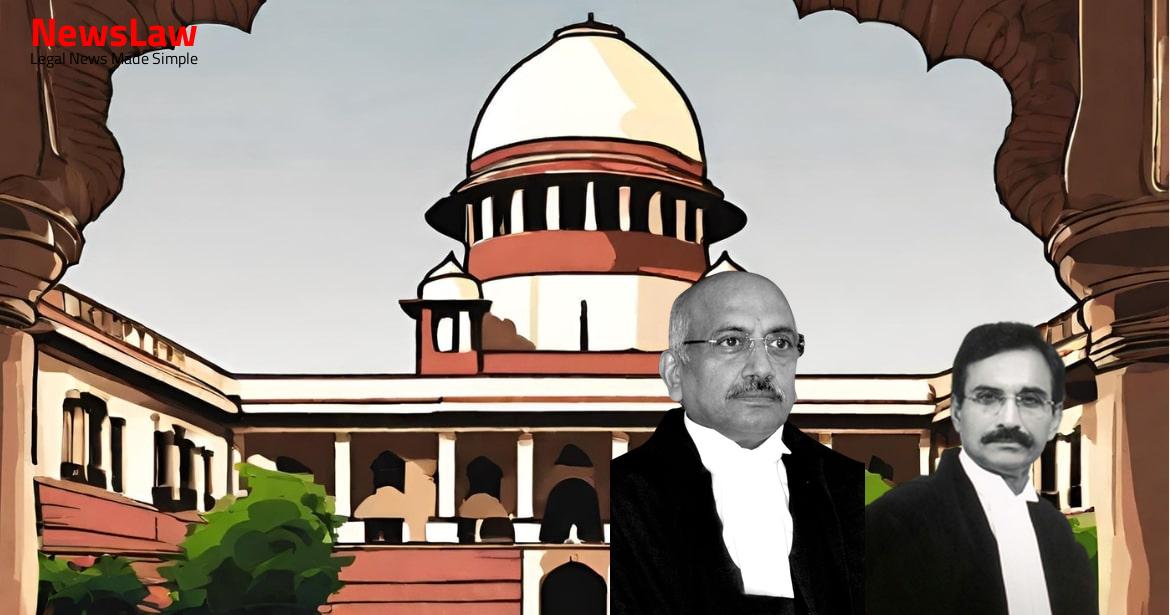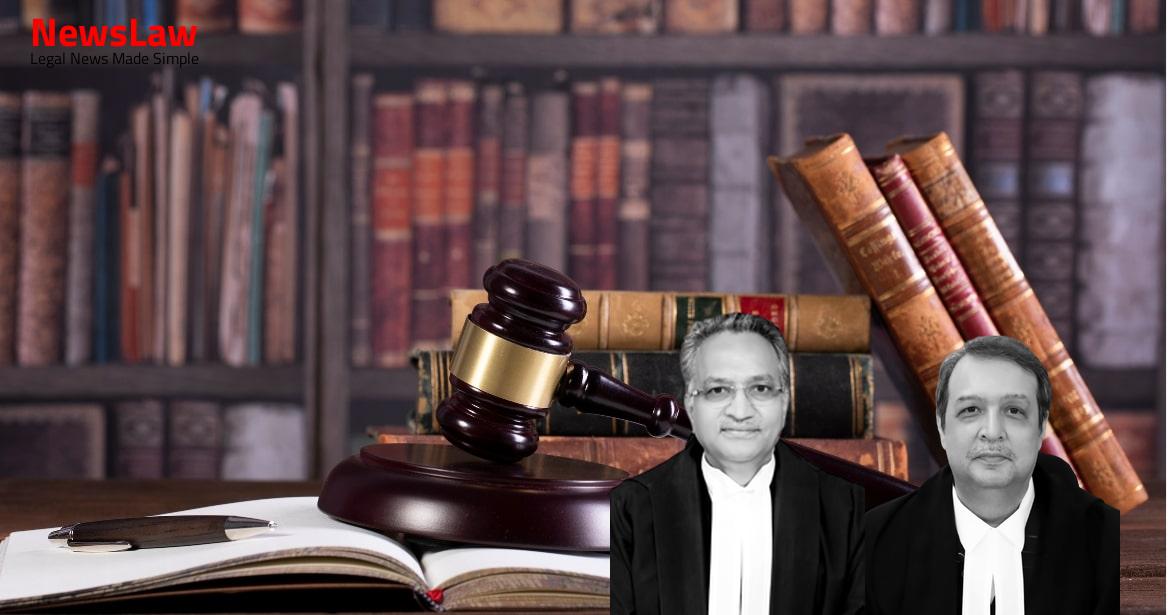Delve into a comprehensive legal analysis of a case involving the arbitration of a preference shares dispute. Uncover the intricate court’s exploration of non-arbitrable matters and the crucial role of invoking arbitration clauses in such intricate financial disagreements.
Facts
- Petitioner company filed an Arbitration Petition seeking appointment of an Arbitrator on behalf of respondent Nos. 1 to 4.
- Respondent Nos. 1 to 4 had to convert their preference shares into equity shares based on reports of auditors and valuer.
- Dispute arose over the conversion formula to be applied for the preference shares of respondent Nos. 1 to 4.
- Petitioner proposed conversion of OCRPS into equity shares, but respondents claimed a higher percentage of paid-up share capital.
- Agreements dated 2007, 2008, 2013, and 2017 govern the subscription of equity shares and OCRPS by respondent Nos. 1 to 4 in the company.
- The arbitration is to be conducted as a single process by a single Arbitral Tribunal due to the same subject matter under different agreements.
Also Read: Electoral Malpractices in Mayor Election
Arguments
- Mr. Shyam Divan representing Indus Biotech Private Limited argues for resolution of dispute through a single Arbitral Tribunal due to a common transaction between parties.
- Reference made to the cases of Swiss Ribbons Private Limited vs Union of India and Booz Allen and Hamilton INC. vs SBI Home Finance Limited to establish that insolvency and winding up matters are non-arbitrable.
- Nature of transaction under SS and SA agreements discussed, emphasizing on redemption terms and value.
- Objection raised by respondent No. 4 regarding invocation of arbitration clause countered by Mr. ANS Nadkarni, representing the promoters as respondents 5 to 11.
- Dr. Singhvi counters the contention by Indus Biotech Private Limited, stressing the stringent consideration of proceedings under Section 7 of IB Code.
- Adjudicating Authority should record default and admit the petition upon showing the due debt not being paid as per Dr. Singhvi.
- The parties opposed the reference to arbitration due to lacunae in how the clause was invoked and the arbitrator’s name suggested.
- The only remedy for the parties is to resolve their dispute through arbitration as per the arbitration clause.
- The question arises whether a Single Tribunal or separate Tribunals should be appointed for each agreement.
- It is contended that there cannot be composite arbitration, but the interests of the corporate debtor are safeguarded through appeal processes.
- The Adjudicating Authority’s decisions, whether admitting or rejecting a petition, are appealable to higher courts.
- The observation on the justification of arbitration invocation is only relevant if the case has reached a stage of proceedings in rem.
- The Court laid down a fourfold test for determining when a dispute is not arbitrable, including situations involving actions in rem.
- The redemption payment under OCRPS is due within 15 days of redemption, and clauses in the document provide for early redemption in certain circumstances.
Also Read: Balancing Power and Transparency: Electoral Bonds Struck Down, Disclosure Mandated
Analysis
- The Adjudicating Authority must ascertain the existence of default from records or evidence furnished by the financial creditor within a specified timeline to ensure the efficiency of the process.
- The nature of the proceedings under the Insolvency and Bankruptcy Code (IBC) transforms into proceedings in rem upon admission of the application, giving it erga omnes effect.
- The Adjudicating Authority has a duty to consider contentions put forth on the application filed under Section 7 of the IBC to determine if default has occurred.
- The scope of the proceedings under Section 7 of the IBC involves a judicial determination by the Adjudicating Authority to establish the occurrence of default before admitting a petition.
- The evaluation of default is crucial before triggering the Corporate Insolvency Resolution Process (CIRP) to prevent solvent companies from unnecessary insolvency proceedings.
- When default is established, the creditor loses control of the proceedings, and the resolution process follows the mechanisms provided by the IBC.
- The Adjudicating Authority’s decision on default triggers the constitution of the Arbitral Tribunal for further resolution.
- The existence of a dispute can make the matter non-arbitrable once insolvency proceedings commence.
- The order of the Adjudicating Authority can be scrutinized for errors in entertaining applications under different sections.
- The Adjudicating Authority’s satisfaction of default is a critical factor in determining the fate of the application under the IBC.
- Premature conclusions on default may arise if disputes regarding debt repayment and equity shares issuance remain unresolved.
- Insolvency or intracompany disputes should be addressed by a centralized forum like a court, as they are actions in rem.
- Criminal cases are not arbitrable as they relate to sovereign functions of the State and are offenses against the State.
- Matrimonial disputes like dissolution of marriage are not arbitrable.
- Matters relating to probate and testamentary matters are non-arbitrable as they are actions in rem.
- Disputes that are in rem are non-arbitrable, including those under the Insolvency and Bankruptcy Code (IB Code) proceedings.
- Past decisions like Booz Allen and Hamilton Vs. SBI Home Finance Ltd. do not need detailed reference as they have been discussed in previous cases like Vidya Drolia.
- The cases of Swiss Ribbons Private Limited vs. Union of India and Pioneer Urban Land and Infrastructure Limited vs. Union of India were considered for the IB Code scope and ambit.
- The IB Code scheme and working were analyzed in the case of Innoventive Industries Limited vs. ICICI Bank.
- Certain disputes like criminal offenses, illegal agreements, and matters of status like divorce cannot be referred to arbitration.
- Care and caution must be taken when applying the principles mentioned.
- Any Dispute arising from this Agreement must be resolved as per Section 20.4.2
- All parties agree to settle Disputes related to this Agreement
- Disputes may include issues concerning breach, termination, or validity of the Agreement
- Consideration of the nature of the issues involved in converting preference shares into equity shares is important.
- The resolution of such issues can be addressed by an Arbitral Tribunal consisting of the same members but separately constituted for each agreement.
Also Read: Recall of Resolution Plan Approval: Legal Analysis
Decision
- Arbitration to be held at Mumbai with three arbitrators
- Arbitration Petition No.48 of 2019 allowed
- Disputes to be settled by arbitration
- Mutual nomination of third arbitrator as Chairperson
- Arbitral Tribunal to decide on proceedings modalities
- Separate proceedings or clubbing for different disputes
- All other merit-based issues to be handled by Arbitral Tribunal
- Failure of respondents to nominate arbitrator
- Justice V.N. Khare nominated by Indus Biotech Private Limited
- Justice R.M. Lodha appointed as second arbitrator
Case Title: INDUS BIOTECH PRIVATE LIMITED Vs. KOTAK INDIA VENTURE (OFFSHORE) FUND (EARLIER KNOWN AS KOTAK INDIA VENTURE LIMITED) (2021 INSC 216)
Case Number: ARBIT.CASE(C) No.-000048 / 2019



